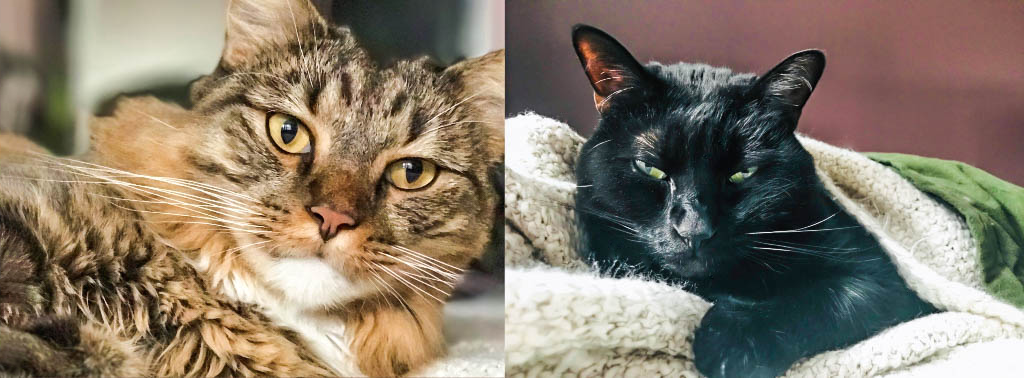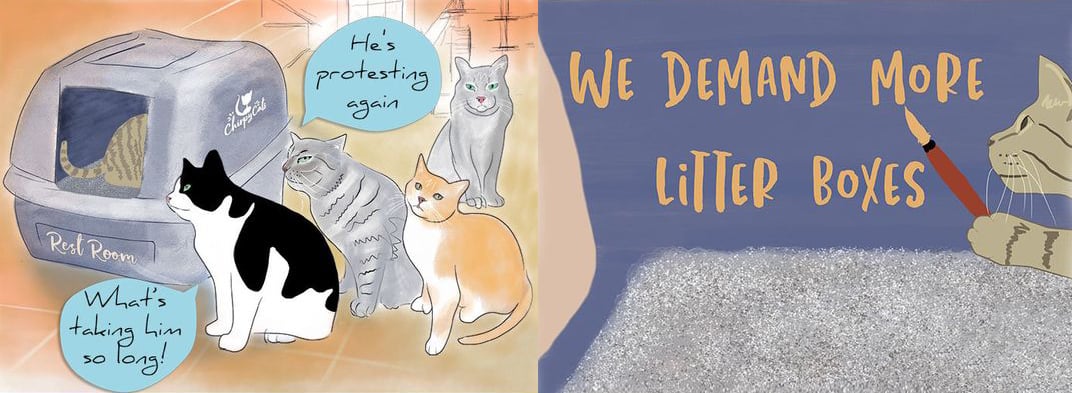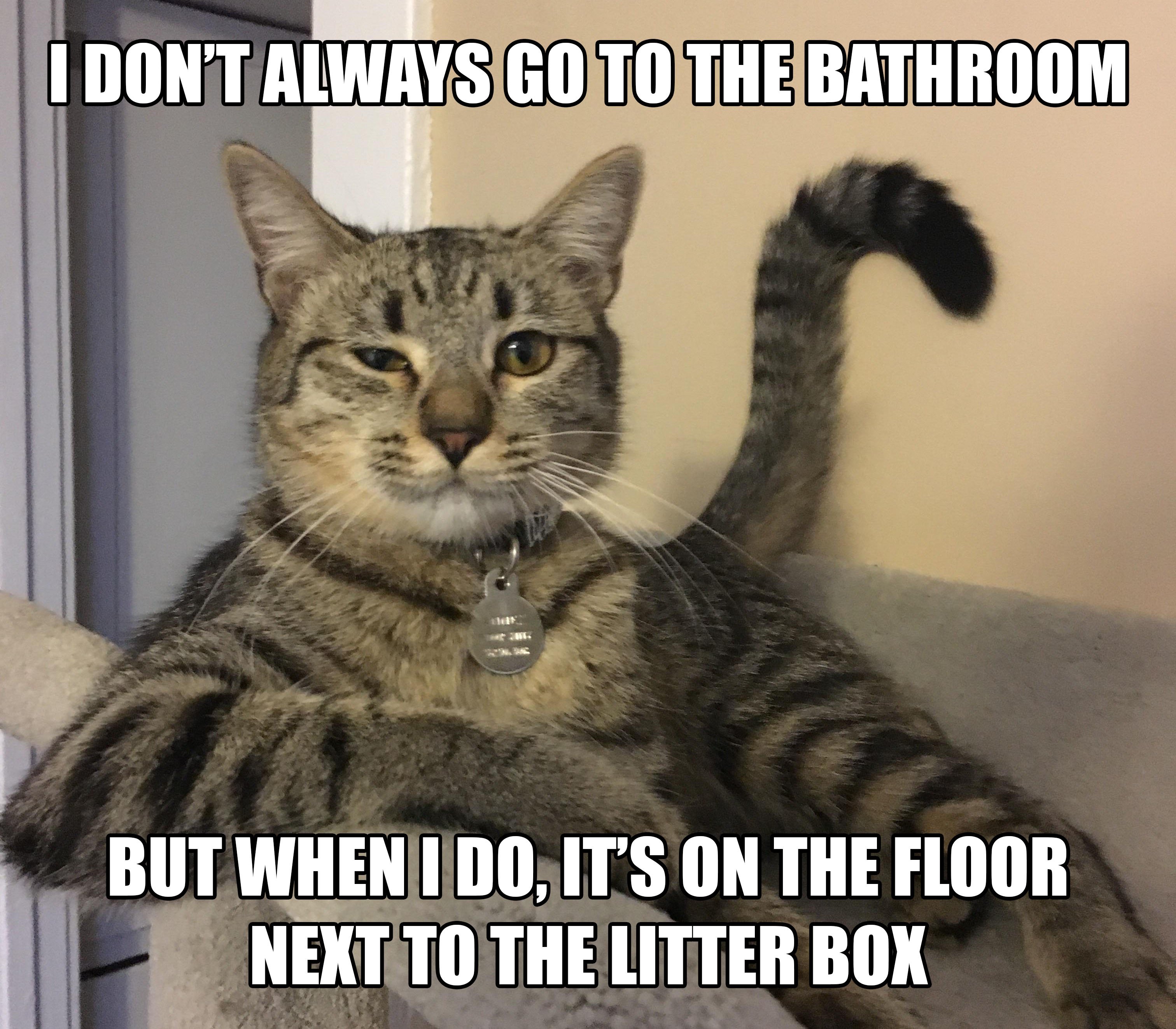Litter boxes are a great indication of your cat’s health. The size and frequency of urination and the smell and color of feces can tell you a lot about the health of your pet. Keeping an eye on your litter box can clue you into your cat’s gut health, level of hydration (or level of dehydration) and even show early signs of urinary tract issues. All too often, cats stop using their litter boxes to the confusion and dismay of their human counterparts. They could be urinating in the sink or tub, defecating in the bed sheets, or going to the bathroom anywhere but the litter box.
Litter box aversion is a common problem among cats that often leads to them spending an extended amount of time in a shelter or worse being euthanized. Every year approximately 3.2 million cats enter shelters in the United States. This means about 860,000 cats will be euthanized if they are not adopted.
Over my years in the pet industry and owning cats of my own I have gained a lot of experience with animal wellness. With this being said I am not a vet. It’s important to note that pet parents should always consult their veterinarian before making changes to solve what they think is a behavioral issue. Please consult your veterinarian first to confirm whether this is a medical concern for your animal.
 I have had many pets in my life, but currently I just have these two fur babies. Lorde Monkey Chunk (left) is a Maine Coon mix I adopted and Mister Charlie Bitters (right) followed my fiancee home after being abandoned.
I have had many pets in my life, but currently I just have these two fur babies. Lorde Monkey Chunk (left) is a Maine Coon mix I adopted and Mister Charlie Bitters (right) followed my fiancee home after being abandoned.
Ask the Right Questions
The best way to solve this issue is to look for the signs. Like I said before litter box aversion is characterized by urinating or defecating outside the litter box or even in a sink or tub. However, if your cat is choosing not to use the litter box it could be a medical issue. Feline Urinary Tract Disease, Diabetes, Irritable Bowel Disease (IBD), Renal Issues, Constipation, or any other number of concerns. Always talk to your vet! If it is not caused by an underlying medical issue you need to ask yourself the right questions to identify the cause and find the best solution.
"Where is your cat's litter box located?"
Keep the litter box in an easily accessible and quiet location. Think of it this way— Would you use the box there if you were a cat? The less stress the better! Don’t constantly change locations as this causes stress and confusion, but if you do change location make sure your cat knows where the new spot is. Show your cat where the new box is and set them in it — this tactile experience reinforces the new location of the box.
If there are multiple cats in the home the number of litter boxes also needs to increase. Always have one more litter box than there are cats in the house (i.e. two cats: three boxes. Four cats: five boxes). Cats are not pack animals and prefer going to the bathroom in private, sometimes separate spaces. An extra box helps prevent an overcrowded litter box that may lead a cat to eliminate somewhere else. This extra box can also be used to transition and introduce new litter formulas— this will be discussed further below.
 Protests usually won't be as organized as this. It's much more likely that you'll find an unpleasant surprise somewhere in your house!
Protests usually won't be as organized as this. It's much more likely that you'll find an unpleasant surprise somewhere in your house!
"What type of litter box do you have?"
Hooded litter boxes increase your chances of litter box aversion as they trap and concentrate the smells within. Cats simply do not enjoy this experience. For human comparison, do you enjoy using a porta potty? If you are concerned about litter spreading, purchase a litter mat. I am a huge fan of the litter mat from Messy Mutts or the Tall Tails Absorbent Mat. The Tall Tails Mat washes well and looks clean even when filled with litter.
"What kind of litter do you use?"
There is a tremendous difference between cheap litter and affordable high-quality litter like Boxie Cat. Better litter means an easier to maintain box, a happier cat, and less litter box aversion. Cheap high dust-content litter can cause respiratory issues for cats especially when using a hooded litter box. This will create a more stressful litter box experience for your cat.
The Boxie Cat flat top clumping technology shown above really helps improve cleanliness which makes for an overall better litter experience for both pet parents and their cats.
This is not to count out pellet litters, I simply prefer clumping litters in my household. Your cat gets a vote too! My cats prefer clumping litter to other alternatives. Perfumed litter is designed for human comfort, not the cats! These concentrated perfumes can be tough on cat noses which are highly sensitive. Boxie Cat Gently Scented is an exception to this, as it is specifically formulated to be safe and calming to cats.
"How often do you clean your litter box?"
A clean litter box is more comfortable for your cat, and the more comfortable your cat is the more likely they are to use the litter box. Scooping daily reduces strong odors that are offensive to little cat noses. Additionally, use a product like Skout’s Honor's Litter Box Deodorizer on and around the box. This spray, “immediately breaks down and destroys odor-causing molecules on contact.” On top of scooping daily, once a month it is important to discard all litter, wash out the box, and replace with new litter. Additionally, replace your litter box each year.
Pro Tip: When it comes to litter box aversion the amount of litter being used has an impact. More is not better! Too much litter is uncomfortable for your cat to stand in and a lot harder to scoop. Most cats prefer litter to be about two inches deep. However, long-haired cats might like even less.
"Have you recently introduced new litter?"
When introducing a new litter, I recommend introducing it in the extra box in your household. (Remember, if you have two cats I recommend having three boxes) I don’t recommend mixing new formula and old formula litter in the same box—this dilutes both litter’s effectiveness. Mixing formulas makes it harder for your cat to make an educated litter decision! I recommend filling this extra litter box with your new litter formula.
Pay attention to see if your cats use the new litter box for both urine and defecation. If they only use the new box for urine sporadically, this may mean the cat is simply exercising its territorial rights. Give your cats a solid month to test out the new litter and see if it is preferred. This way, you do not upset the existing litter box balance. This creates a comfortable litter transition that will lower the possibility of litter box aversion.
"What are you feeding your cat?"
Diet can influence litter box aversion depending on your feeding choices. Cats on a high water content diet typically have better urinary health. Unfortunately, no matter how fancy your water bowl is cats never drink enough water. Adding canned, re-hydrated freeze-dried, or raw food are great ways to add moisture into the diet. I like to recommend Feline Natural’s Hydration Booster which “can provide 25% of a cat’s daily water requirement.” Two of my other favorite options are Answer’s Goats Milk and Primal’s Bone Broth as they are also great for gut health which helps with overall health and wellness.
 Asking these questions when making changes in their cat's life can help cat owners avoid this issue.
Asking these questions when making changes in their cat's life can help cat owners avoid this issue.
Final Thoughts
Being a cat owner can be the best thing ever, but it can also come with its own variety of struggles. Litter box aversion is just one issue a pet parent may face. Creating an overall better litter experience for your cat can help reduce the chances of behavioral litter box aversion. Keep in mind how various environmental factors from the location of the litter box to the type of litter being used can affect a cat's litter experience.



